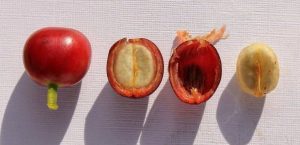Treating IBS with FODMAPS

Diagnosing IBS?
1 in 5 Australians live with Irritable Bowel Syndrome (IBS), an umbrella term for a range of gastrointestinal symptoms like bloating, growling, irregular and uncomfortable bowel movements, stomach pain and distension- the list goes on. Essentially IBS is just a label, many people know they have gut problems but haven’t got an IBS diagnosis.
Understanding what triggers IBS
It is agreed that stress, anxiety and physical activity can trigger IBS, but nutritional triggers are still up for debate. For decades now the primary nutrition advice given by GPs and Dietitians has been to increase water and dietary fibre- and while these simple tips provide some initial relief, for some the problems remain largely unsolved. For the majority, this advice offers very little, if any, relief and these individuals are left to navigate the complex task of trying to piece together their own dietary puzzle. With nowhere else to turn they are left with the scatter-gun approach of trying to identify the foods that caus their issues.
Given the complex nature of IBS and limited high quality research practitioner advice has often fallen short. Many practitioners prefer not to diagnose IBS and encourage the ‘just get on with it’ approach, while at the other extreme the IBS label is applied all too frequently. Some practitioners have even adopted current food fashions with complete avoidance of dairy and gluten promoted without any hard evidence.
Isn’t it about time that some “real” science, backed by reputable and medically scrutinised research was applied to the problem?
What are FODMAPS?
Fast forward to 2005, and Monash University’s research team made ground-breaking advances into the function of the ‘gut nervous system’, identifying FODMAPs or Fermentable Oligo-, Di-, Monosaccharides and Polyols as the culprit in many bowel/gut conditions. Wow, what a mouth full, but a breakthrough for many sufferers of gastro-intestinal problems.
The main things to know is that FODMAPS are naturally occuring and found in small amounts in almost all food groups but they are VERY difficult to digest. FODMAPs are poorly absorbed in the small intestine and they then travel into the large intestine where the trouble begins. Here they absorb water and then begin to ferment, triggering a range of gastrointestinal symptoms. The Monash team discovered that a by reducing the intake of foods that are high in these fermentable sugars, or FODMAPS, reduces many bowel symptoms and gastrointestinal symptoms. Using the FODMAPs approach they found 75% of people living with bowel issues will see a reduction in, or in some cases, a resolution of their symptoms.

What foods are high in FODMAPS?
Foods that are high in FODMAPS, are found across a wide range of different foods, with many being highly nutritious. Making appropriate dietary changes to address the best level of FODMAPS in the diet is something that needs to be monitored by a professional. Only with proper guidance and nutrition advice can the right balance be found to achieve good health outcomes while eliminating gut and bowel problems. When something as nutritious as mushrooms or cauliflower, or even garlic (long regarded by many as a wonder food), can be adding to your health problems it is important to get the right advice.
How does a FODMAPS diet work?
The process involves eliminating all FODMAP foods (as best you can) from your diet for a set period. During this time, most people will see a significant reduction in symptoms, some become symptom-free but most will see at least some reductions. A gradual re-introduction of each of the different FODMAP groups into the diet, through a series of dietary challenges will find the main offenders of your individual gastrointestinal problems.
While it is always tempting to go it alone, the right support and right advice from your nutrition professional is the sure-fire way to achieve lasting success. Seeking professional dietary advice will avoid the pitfalls of using Dr Google, where the likelihood of beginning a diet that is too restrictive can all too often lead to unintended nutritional deficiencies leaving you feeling worse than when you started.
For more information, contact us here or book an online appointment






